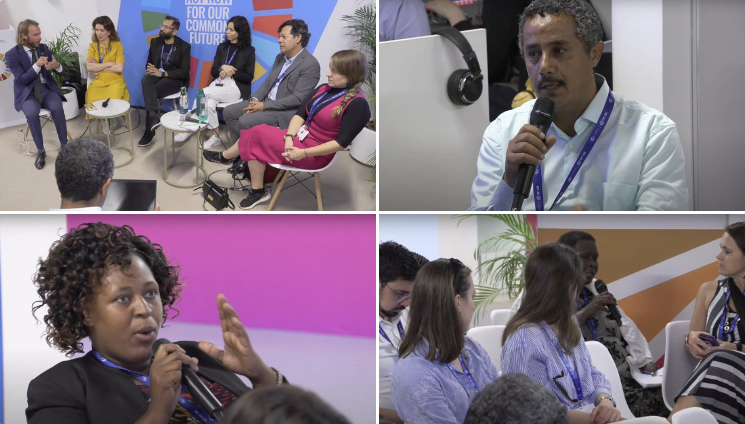The side event, co-lead by the Local2030 Coalition, FAO, UN-Habitat, UNDP, UCLG and the Global Task Force for Local and Regional Governments, aimed to explore and promote the significance of multilevel governance in addressing the interconnected challenges of climate change, food security, and biodiversity conservation. As nations strive to meet their climate commitments and ensure sustainable development, understanding the role of diverse stakeholders and different governance levels is crucial.
The event featured a combination of discussions, case study presentations, and an interactive Q&A session. Participants included representatives from national governments, subnational and local governments, local communities, research institutions, private sector and international organizations. The aim was to encourage cross-sectoral dialogue, knowledge sharing, and the development of actionable recommendations. This event sought to facilitate a dynamic discussion on how effective multistakeholder and multisector collaboration can enhance the resilience of ecosystems and communities.
Moderator: Jean-Baptiste Buffet, Head of Global Policy and Advocacy, United Cities and Local Governments
Speakers:
- Francisco Mendonça, General Coordinator, New Research and Innovation Arrangements for Climate Emergence (NAPI EC), Paraná State, Brazil
- Kata Tüttő, Vice-Mayor, Budapest, Hungary
- Lea Ranalder, Specialist, Sustainable Cities, UN-Habitat
- Paz Gonzalez, Coordinator for Climate Action, Water and Biomes Programs, Fundacion Avina
- Sid Mehta, Sr. Director Ancillary Services, Simon Fraser University
Main takeaways
- Collaborative strategies are essential to address the interlinked challenges of climate change, food security and biodiversity loss at the local level. Recognizing the importance of cross-sectoral collaboration and coordination among all actors is critical to developing and implementing effective solutions to these multifaceted challenges.
- Unlocking Multilevel Governance requires collaboration among all actors and sectors; active leadership from local and regional governments in climate action; and the imperative localization of the Sustainable Development Goals (SDGs).
- Coalitions such as the Local2030 Coalition play a crucial role in bringing all actors together by promoting the need for empowerment, capacity building, access to alternative sources of financing, sharing of experiences and innovation for effective climate action at the local level.
- As part of the Horizon Europe program, the EU has launched a Mission “100 Climate-Neutral and Smart Cities by 2030” with the support of the European Committee of Regions. The objectives of the mission are to achieve 100 climate-neutral and smart European cities by 2030 and to ensure that these cities act as experimentation and innovation hubs to enable all European cities to follow suit by 2050.
- The European Green Deal, the EU’s strategy to set the EU on the path to a green transition, will not happen without and integrated social contract guarantying a close link between the Green Deal and social justice.
- Raising the voices from the Global South and enhancing its representation in discussion forums and decision-making processes are vital actions for building capacities, fostering collaboration, and advocating for impactful change.
- Academia is pivotal in unlocking knowledge, raising awareness, disseminating information for public policies, and serving as action labs for scalable solutions, emphasizing collaboration with universities, private sector, public institutions, and citizens for the development of just and green public policies.
- Local procurement and alliances have a crucial role in decarbonization efforts, aiming to build capacities and double the return on investments for local communities that can be scaled up in many other cities.
- The Alliance for Voices for Just Climate Action brings together global and local voices by connecting a diverse range of civil society organizations to act as agents of change to co-create locally relevant, inclusive and financeable climate solutions.
- Empowerment, capacity building, peer learning, innovation in local public procurement, social justice, scaling up successful examples, participatory policies, and raising awareness are key to coordinated climate action at the local level.
Key recommendations for action
- Encourage collaboration among all actors and sectors for effective multilevel governance to address the interconnected challenges of climate change, food security, and biodiversity conservation.
- Foster integrated and collaborative approaches and strategies to tackle the intricate challenges of climate change, food security, and biodiversity loss at the local level.
- Promote active leadership from local and regional governments in climate action.
- Foster closer partnerships with Academia to unlock and disseminate knowledge for decision-making processes and public policies.
- Empower civil society leadership, co-building narratives, and fostering local innovation to enhance the resilience of ecosystems and communities.
- Bring voices from the Global South in discussions and decision-making processes in the challenges of climate change, food security, and biodiversity.
- Advocate for coalitions such as the Local2030 Coalition as vital platforms to bring together a wide range of stakeholders for effective climate action at the local level.
For more information, please visit: https://www.local2030.org/


Comments